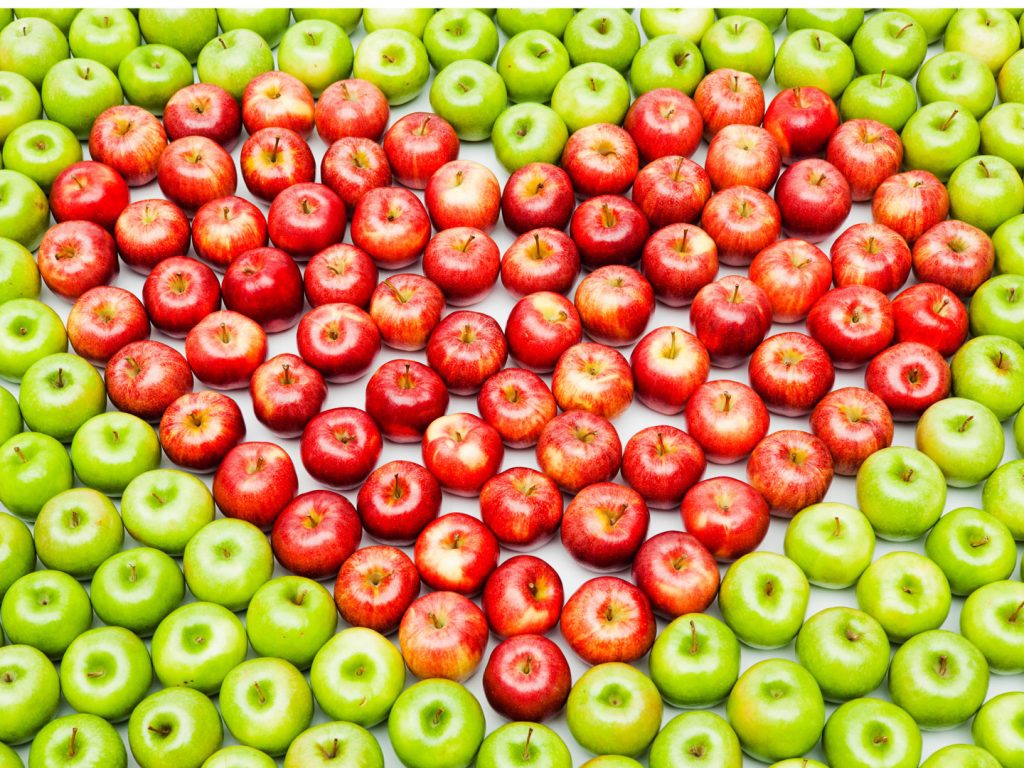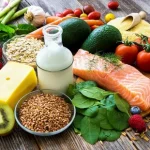By Lana Barhum
Updated on February 06, 2024
Medically reviewed by Elizabeth Barnes, RDN
Snacks often get a bad reputation, but you can snack on the right foods and include them in a heart-healthy diet. Making heart-healthy snack choices can add more nutrition to your diet and keep you energized and full between meals.
Rather than reaching for snacks that contain lots of saturated fats, sugar, and salt, consider snacking on whole foods. This includes fruits and vegetables, nuts, seeds, and whole grains. These healthy snack options can add fiber, antioxidants, minerals, and vitamins to your diet and improve your overall heart health.
This article will cover what makes some snacks heart-healthy, snack ideas, and how to add snacks to an overall heart-healthy diet.
What Makes a Snack Heart-Healthy?
Heart disease is the leading cause of death for American adults across all genders and ethnic and racial groups.1 The term “heart disease” is used to describe conditions that affect the heart and/or its structure, arteries, valves, vessels, and electrical system.
Some types of heart disease are:
- Cardiomyopathy
- Coronary artery disease
- Heart arrhythmias
- Heart failure
- Heart valve disease
- Pericardial disease
You can manage your heart health by paying attention to your diet.
The foods you eat affect your heart because they affect:2
- Blood pressure
- Triglycerides
- Cholesterol levels
- Inflammation
The American Heart Association recommends the following dietary patterns for improving cardiometabolic health:3
- Maintaining a healthy weight by balancing food calories and exercise
- Eating a diet plentiful in fruits and vegetables
- Choosing whole-grain food options
- Eating healthy proteins: plant sources, lean meats and poultry, fish and seafood, and low-fat and fat-free dairy
- Choosing liquid plant oils (i.e., olive oil) over topical oils (i.e., palm oil) and partially hydrogenated fats (i.e., vegetable oil)
- Choosing minimally processed foods over ultra-processed ones
- Minimizing your intake of foods and beverages with added sugars
- Choosing and preparing foods with little or no salt
- Eliminating or reducing alcohol intake
11 Heart-Healthy Snacks
The snack ideas below are healthy and delicious and add fiber to your diet, thus supporting heart health and healthy digestion. Plus, they are low in calories, saturated fat, and sodium, which makes them heart-healthy and lower-calorie options for supporting a healthy weight.
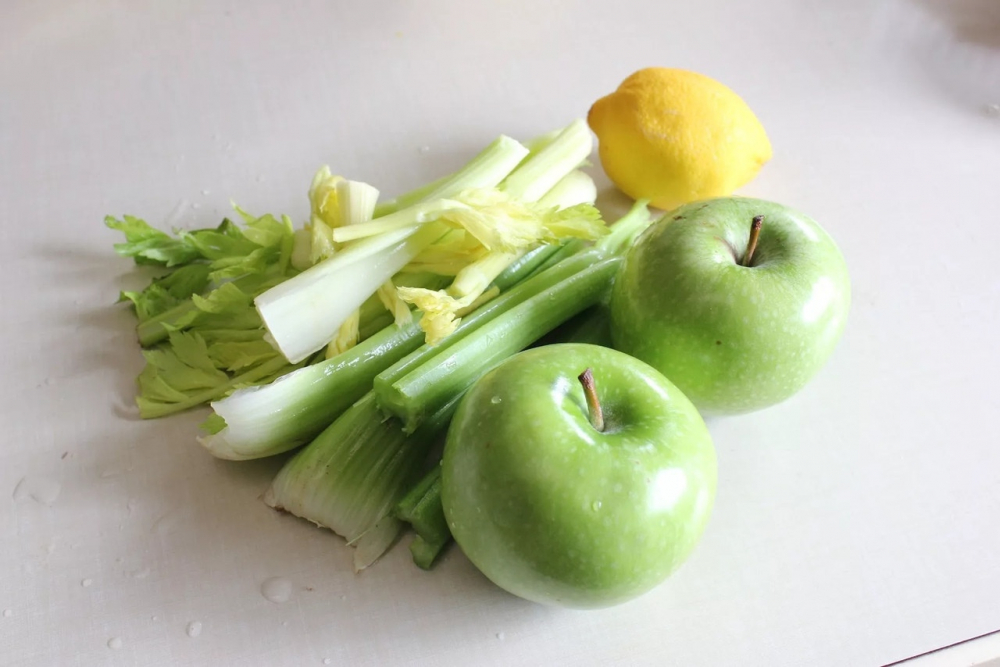
Apples
Research shows eating just two whole apples per day is linked to a lower risk for heart disease and its risk factors like high blood pressure.4 Researchers suspect this is because apples contain soluble fiber, which has also been linked to reducing heart disease risk.
Another reason is that apples contain polyphenols, which have been linked to lower serum cholesterol levels, higher high-density lipoprotein (HDL) cholesterol (“good cholesterol”), lower low-density lipoprotein (LDL) cholesterol (“bad cholesterol”), and reduced inflammation.4
Apples are not just good for your heart. They are nutrient-dense because they provide many nutrients per serving. One medium apple contains 104 calories and five grams of fiber. It also contains vitamins C, K, E, B1, B6, copper, and potassium.5
Enjoy an apple with some peanut or almond butter for a heart-healthy, high-fiber, and healthy-fat snack. Or, add 1 cup of apples to a smoothie containing other heart-healthy fruits and vegetables.
Celery
Celery is one of the most important vegetables in the Apiaceae family, which includes carrots, parsley, and parsnips.6 It is an excellent source of vitamins, is low in calories, and provides a wide range of benefits, including promoting heart health.
Celery is water-filled and fiber-packed. It contains phenolic compounds and potent antioxidant properties to reduce inflammation and improve heart health.6 You can eat celery alone or with some nut butter for additional taste and as a healthy fat option.
Roasted Chickpeas
Eating beans and legumes, including chickpeas, is linked to a 14% reduced risk for heart disease, according to a 2019 study reported in Advances in Nutrition.7 Most of the benefit from eating legumes comes from the fiber content. Legumes also contain plant sterols, which can reduce cholesterol and contribute to better heart health.
Roasted chickpeas can be a heart-healthy snack to satisfy cravings for crunchy foods. You can make roasted chickpeas at home or buy some from your favorite store. When purchasing, you will want to avoid brands that contain lots of sodium or sugar.
Hummus
Hummus is an ancient Middle Eastern dip made from chickpeas, tahini, lemon juice, garlic, and olive oil. It contains olive oil, making it a great source of heart-healthy fats. Pair it with heart-healthy vegetables like carrots, celery, bell peppers, broccoli, cauliflower, and tomatoes.
A drawback of hummus for heart health is that it may be high in sodium (up to 607 milligrams per serving), which can increase blood pressure and your risk for heart disease.8 Therefore, it should be consumed in moderation along with other low-sodium snacks and foods.
EXERCISES FOR OVERWEIGHT | OBESE PEOPLE. SET NO. 1: GENERAL EXERCISES TO STRENGTHEN MUSCLES AND IMPROVE JOINT MOBILITY
Yogurt and Berries
Eating yogurt may reduce the risk of heart disease in people with high blood pressure, according to a 2018 study reported in the American Journal of Hypertension.9 Choose yogurts that are low in sugar and high in protein, such as Greek yogurt.
Greek yogurt pairs well with blueberries, which are also linked to improved heart health. Blueberries contain fiber, potassium, folate, vitamins C and B6, and anthocyanins (which are rich in antioxidant and anti-inflammatory effects).
One 2020 comprehensive review found a higher intake of anthocyanin-containing foods, including strawberries, blueberries, blackberries, black currant, red currant, and raspberries, might reduce your risk for ischemic heart disease, heart attack, and stroke.10
Smoothies
Smoothies are a blank slate to supercharge your heart health. They can offer a combination of fiber, vitamins, antioxidants, omega-3 fatty acids, and more. Omega-3 fats help manage inflammation and other body processes.
Your smoothie can be as simple as blending frozen or fresh fruits with heart-healthy ingredients like low-fat milk and yogurt, nut butter, chia seeds or flaxseed, applesauce, 100% fruit juice, and vegetables.11
Nuts and Seeds
Most nuts and seeds contain monounsaturated fats (healthy fats), vitamin E, and other natural substances that are good for the heart. One drawback is that nuts can be high in calories and may be salted, adding a large amount of sodium. Even so, choosing nuts instead of a less healthy snack option helps you stick to a heart-healthy diet.
Some nuts, like walnuts, are a great source of plant-based omega-3 fatty acids.12 Enjoy a handful of walnuts with a piece of fruit or some blueberries.
Seeds to add to a heart-healthy snack include flaxseed, hemp, chia, or sesame. You can add seeds to Greek yogurt or a healthy smoothie. Or you can snack on a handful of low-salt or sodium-free pumpkin or sunflower seeds.
Rice Cakes
Rice cakes are made by heating rice grain (brown and white) and puffing them into round-shaped patties. They make a crunchy snack that is easy to take along. They are healthy when eaten in moderation, are low in calories and fat, and contain zero cholesterol.13 However, they do not contain a lot of vitamins and minerals.
For a heart-healthy snack, consider plain, unsalted rice cakes made from brown rice. Research shows brown rice contains phenolic compounds, which can reduce cell damage linked to chronic diseases, including heart disease.14
Brown rice is also rich in fiber. A 2017 Journal of Chiropractic Medicine review of 31 studies from 1980–2017 and found that higher dietary fiber reduced cardiovascular risk by 10% to 20%.14
Consider adding heart-healthy toppings to your rice cake snack. Try putting avocado and tomato slices or a spoonful of almond butter on top for a nutritional and tasty snack.
EXERCISES FOR OVERWEIGHT/OBESE PEOPLE. SET NO. 2: POWER EXERCISES WITH A GYMNASTIC ELASTIC BAND/TERABAND
Matcha Tea
Matcha tea is a green tea loaded with epigallocatechin gallate (EGCG)—a polyphenol substance in green tea with antioxidants and anti-inflammatory properties.15 Consuming EGCG-rich matcha tea may also improve your heart health, as it has been found to reduce heart disease and stroke in many studies.
Studies on EGCG have found that it can prevent atherosclerosis—a buildup of fatty substances on the walls of the arteries.15 It may also reduce inflammation and cellular damage.
Sardines in Olive Oil
Sardines packed in olive oil can offer a mega-dose snack with healthy fats, proteins, antioxidants, vitamins, and minerals. Sardines are small fish loaded with omega-3 fatty acids.
The heart health benefits of omega-3 fats are well-researched and documented. Studies show an omega-3-rich diet may reduce heart disease risk and the risk for cardiovascular events (i.e., heart attack, stroke, etc.) and improve cholesterol numbers while providing anti-inflammatory benefits.16
Olive oil is also connected to improved heart health. One 2020 Journal of the American College of Cardiology study found higher olive oil intake was linked to a lower risk of heart disease.17 This study promoted the substitution of margarine, butter, mayonnaise, and dairy fat with olive oil as a way to reduce heart disease risk and improve overall heart health.
Dark Chocolate
Dark chocolate is full of heart-healthy compounds. This is because it is high in flavonoids—specifically flavanols, which have been associated with a lower risk for heart disease.18 Some studies have also suggested chocolate and cocoa consumption can reduce insulin resistance (when cells in the body don’t respond well to insulin and can’t take up glucose, or sugar, from the blood) and high blood pressure (hypertension) in adults.
Consider a handful of almonds with dark chocolate pieces for an enhanced heart-healthy snack. Like other nuts and seeds, almonds can improve lipid (fat) levels in the blood.
One 2014 study found almonds increased antioxidants in the bloodstream and led to reduced and improved blood pressure.19 The study’s researchers recommended eating a handful of almonds daily to achieve these results.
EXERCISES FOR OVERWEIGHT/OBESE PEOPLE. SET NO. 3: POWER EXERCISES WITH DUMBBELLS. WEIGHT IS SELECTED INDIVIDUALLY. IT IS RECOMMENDED TO START WITH 1-2 KG
Prepackaged Snacks
Shopping at your local grocery store for healthy snacks can sometimes be challenging. The American Heart Association recommends reading nutrition labels and serving sizes to determine the health content of prepackaged snacks.11
Be aware of following when shopping for prepackaged snacks:
- Added sugar and sodium
- Artificial ingredients, processed foods, and fillers
- Additives and unhealthy ingredients, such as hydrogenated oils and trans fats, artificial colors and flavors, processed oils (i.e., canola or corn), and enriched wheat
Consider snacks with the fewest ingredients and in their natural state (real, whole foods). Look for foods higher in protein and fiber and with unrefined carbs and healthy fats. If you want something sweet, look for snacks made of healthy sugars, such as fruit and honey.
Prepackaged heart-healthy snack options to choose from include:11
- Roasted chickpeas
- Air-popped popcorn or popcorn made with nontropical oil
- Rice cakes and whole-grain crackers
- Unsalted nuts and seeds
- 100% fruit, vegetable or tomato juices
- Fat-free and low-fat cheeses
- Canned fruit in its own juice, water, or a light syrup
- Raisins, dates, figs, and other dried, unsweetened fruits
Eating Plan
Snacks as Part of a Heart-Healthy Eating Plan
Several diets have been linked to optimal heart health, including the Mediterranean, DASH, pescatarian, and vegetarian/vegan.3
Mediterranean Diet
The Mediterranean diet is based on traditional eating patterns of the Mediterranean region—including Greece, Italy, Spain, and the Middle East. It emphasizes vegetables, fruits, whole grains, legumes, nuts, fish, lean meats, olive oil, and low-fat dairy.3
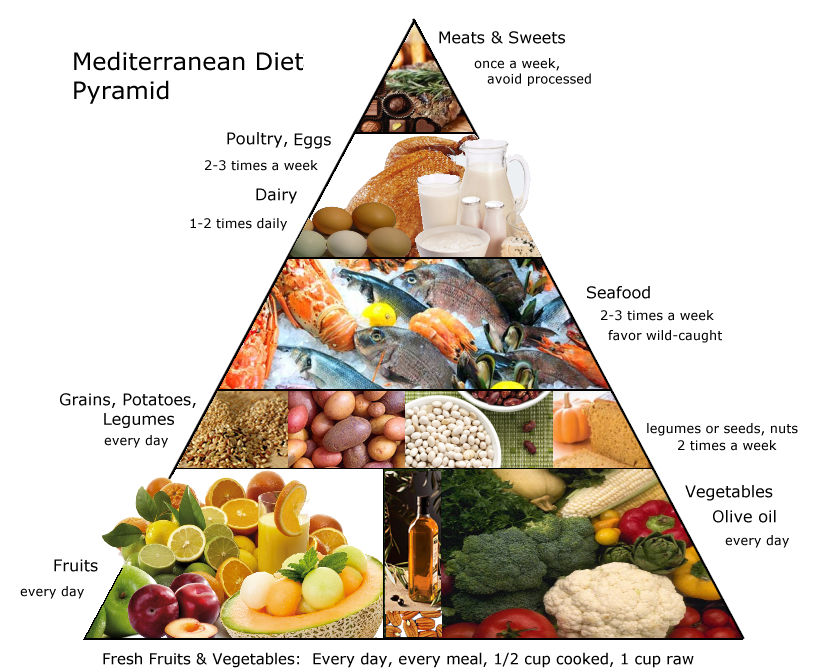
It has been found to reduce the risk of heart disease because it lowers blood pressure, blood sugar, cholesterol, and inflammation.
Some heart-healthy snack options to add to your Mediterranean diet include:
- Roasted chickpeas
- Kale chips
- Hummus varieties, including avocado
- Dried or fresh figs and dates
- Nuts and seeds
DASH Diet
DASH stands for Dietary Approaches to Stop Hypertension. This diet was designed to prevent and treat high blood pressure, which makes it heart-friendly.20
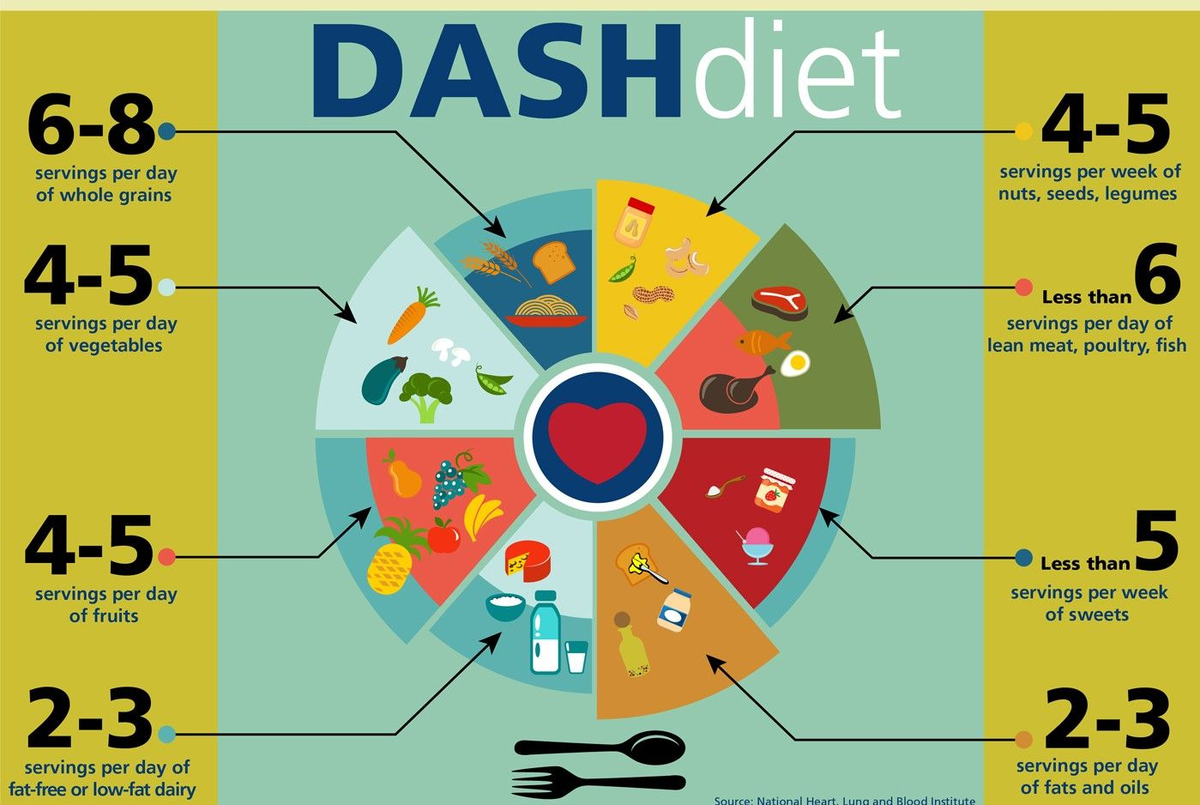
Like the Mediterranean diet, it recommends specific food groups to manage your health and focuses on fruits, vegetables, whole grains, lean meats, and low-fat dairy. It limits red meat, added sugar, refined grains, and sodium.
Snacks to include as part of your DASH diet include:
- Fruits and vegetables
- Low-fat dairy, including cheese sticks and yogurt
- Whole wheat crackers and rice cakes
- Sorbet and fruit ices
- Decaffeinated teas, including green tea
Pescatarian Diet
The pescatarian diet involves a primarily vegetarian diet, along with fish and seafood. Research shows that regularly consuming fish can reduce your risk for heart attack, high blood pressure, atherosclerosis, and stroke.21
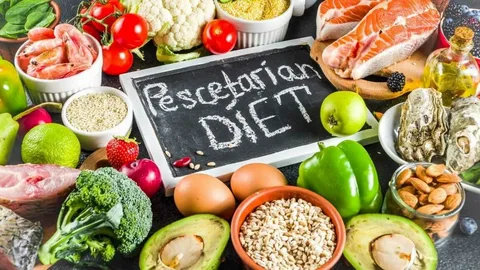
In addition to fish, the pescatarian diet also emphasizes plant foods. Research shows a diet high in vegetables and plant foods can reduce your risk for coronary heart disease.22 This diet can also improve blood lipids, lower blood pressure, and reverse atherosclerotic plaques.
Snacks to add to your pescatarian diet include:
- Fresh and frozen fruits
- Hard-boiled eggs
- Low-fat dairy
- Low-fat cheese sticks
- Carrot or celery sticks
- Sliced vegetables and hummus
- Guacamole with whole-grain tortilla chips
Vegetarian and Vegan Diets
People who follow a vegan diet consume only plant-based foods—fruits, vegetables, legumes, soybeans, grains, tofu, seeds, and nuts. People who follow a vegetarian diet may also consume cheese, eggs, and dairy.

Your heart can benefit from a vegetarian or vegan diet in many ways. For example, these diets are higher in fiber (from fruits, vegetables, and grains), which can help you manage cholesterol levels.23
The diet can also help you keep a healthy weight by replacing animal products with lower-calorie and high-fiber foods. Last, many foods in a plant-based diet can help reduce inflammation and protect against heart disease.23
There is sometimes a risk of nutrient deficiency with a plant-based diet.23 You will want to take care when replacing meat-based foods with foods that do not provide sufficient protein, vitamins, and minerals.
You can overcome the potential for such a deficiency by choosing suitable vegetarian protein sources. For example, soy, tofu, and quinoa are all excellent protein alternatives, while lentils and spinach can help improve iron levels. As an additional benefit, a healthcare provider can recommend a multivitamin or supplement if needed.
Snacks to add to a vegan or vegetarian diet include:
- Fruit or nut butter on whole-grain toast
- Crackers with guacamole
- Homemade trail mix
- Hummus with your favorite veggies
- A fruit-veggie smoothie
- Oatmeal with berries
- Salsa and tortillas
Caloric Balance to Prevent Weight Gain
Energy balance factors in calories consumed vs. calories burned with physical activity.24 What you eat is “energy in,” and what you burn with exercise is “energy out.”
If you want to avoid weight gain, you need to balance your energy equation.24 You need to be active to maintain your weight and overall health. If you are trying to lose weight, you also want a negative energy balance, which involves eating fewer calories per week.
Exercise
The American Heart Association recommends that adults get at least 150 minutes a week of moderate-intensity aerobic activity (i.e., biking, walking, swimming, etc.) or 75 minutes of vigorous aerobic activity (i.e., jogging and recreational sports).25 Try to spread out your physical activity throughout the week and to move throughout your day.
Some heart-healthy snacks are high in calories, so you will need to be be mindful of these if you are trying to avoid weight gain. You want to only include small amounts of good fat in your everyday meals and snacks.26
EXERCISES FOR OVERWEIGHT/OBESE PEOPLE. HYDROTHERAPY MODULE: SWIMMING AND HYDROTHERAPY, EXERCISES IN THE WATER
Heart-healthy snacks that contain high levels of good fats you might want to limit include:
- Nuts and nut butter
- Greek yogurt
- Eggs
- Cottage cheese
- Avocados
- Hummus

DEMO VERSION OF GRS WORKOUTS FOR REHABILITATION OF PATIENTS with obesity ON YOUTUBE
Our website presents sets of exercises for the rehabilitation of the patients with obesity in the following areas:
-
EXERCISES FOR OVERWEIGHT/OBESE PEOPLE. SET NO. 1: GENERAL EXERCISES TO STRENGTHEN MUSCLES AND IMPROVE JOINT MOBILITY
-
EXERCISES FOR OVERWEIGHT/OBESE PEOPLE. SET NO. 2: POWER EXERCISES WITH A GYMNASTIC ELASTIC BAND/TERABAND
-
EXERCISES FOR OVERWEIGHT/OBESE PEOPLE. SET NO. 3: POWER EXERCISES WITH DUMBBELLS. WEIGHT IS SELECTED INDIVIDUALLY. IT IS RECOMMENDED TO START WITH 1-2 KG
-
EXERCISES FOR OVERWEIGHT/OBESE PEOPLE. HYDROTHERAPY MODULE: SWIMMING AND HYDROTHERAPY, EXERCISES IN THE WATER
Conclusion
Achieving and maintaining a healthy weight can be a great strategy for heart health. It may reduce your risks for conditions that damage your heart, such as hypertension, high cholesterol, type 2 diabetes, coronary heart disease, stroke, and more.
Summary
Making heart-healthy snack choices can help you manage hunger, improve energy and mood, and maintain your best heart health. Snacking for a healthy heart often involves eating whole foods like foods and vegetables, whole grains, nuts, and seeds. It also avoids snacks that contain high amounts of saturated fats, sugars, and salts.
With prepackaged snacks, you should read nutritional labels and be mindful of serving sizes. You will also want to include only small amounts of good fats with meals and snacks.
To follow a heart-healthy diet, you will want to be mindful of the type of diet you follow. Some diets, like the Mediterranean, DASH, pescatarian, vegetarian, and vegan, have been linked to optimal heart health.
But even with these diets, you may have to pay attention to your dietary intake and needs to avoid nutrient deficiencies. Ensure you get enough protein, iron, and other essential vitamins and minerals. Your healthcare provider can recommend supplements if necessary.
Sources
https://www.verywellhealth.com/heart-healthy-snacks-8553568
- Centers for Disease Control and Prevention. Heart disease facts.
- Harvard Health Publishing. Heart-healthy foods: What to eat and what to avoid.
- Gardner CD, Vadiveloo MK, Petersen KS, et al. Popular dietary patterns: alignment with American Heart Association 2021 dietary guidance: a scientific statement from the American Heart Association. Circulation. 2023;147(22):1715-1730. doi:10.1161/CIR.0000000000001146
- Koutsos A, Riccadonna S, Ulaszewska MM, et al. Two apples a day lower serum cholesterol and improve cardiometabolic biomarkers in mildly hypercholesterolemic adults: a randomized, controlled, crossover trial. Am J Clin Nutr. 2020;111(2):307-318. doi:10.1093/ajcn/nqz282
- U.S. Department of Agriculture. Dietary Guidelines for Americans, 2020-2025.
- Li MY, Hou XL, Wang F, Tan GF, Xu ZS, Xiong AS. Advances in the research of celery, an important Apiaceae vegetable crop. Crit Rev Biotechnol. 2018;38(2):172-183. doi:10.1080/07388551.2017.1312275
- Becerra-Tomás N, Papandreou C, Salas-Salvadó J. Legume consumption and cardiometabolic health. Adv Nutr. 2019;10(Suppl_4):S437-S450. doi:10.1093/advances/nmz003
- U.S. Department of Agriculture FoodData Central. Hummus.
- Buendia JR, Li Y, Hu FB, et al. Regular yogurt intake and risk of cardiovascular disease among hypertensive adults. Am J Hypertens. 2018;31(5):557-565. doi:10.1093/ajh/hpx220
- Mattioli R, Francioso A, Mosca L, Silva P. Anthocyanins:a comprehensive review of their chemical properties and health effects on cardiovascular and neurodegenerative diseases. Molecules. 2020;25(17):3809. doi:10.3390/molecules25173809
- American Health Association. Healthy snacking.
- Ros E. Nuts and CVD. Br J Nutr. 2015;113 Suppl 2:S111-20. doi:10.1017/S0007114514003924
- U.S. Department of Agriculture FoodData Central. Snacks, rice cakes, brown rice, plain, unsalted.
- McRae MP. Dietary fiber is beneficial for the prevention of cardiovascular disease: an umbrella review of meta-analyses. J Chiropr Med. 2017;16(4):289-299. doi:10.1016/j.jcm.2017.05.005
- Eng QY, Thanikachalam PV, Ramamurthy S. Molecular understanding of epigallocatechin gallate (EGCG) in cardiovascular and metabolic diseases. J Ethnopharmacol. 2018;210:296-310. doi:10.1016/j.jep.2017.08.035
- Elagizi A, Lavie CJ, O’Keefe E, Marshall K, O’Keefe JH, Milani RV. An update on omega-3 polyunsaturated fatty acids and cardiovascular health. Nutrients.2021;13(1):204. doi:10.3390/nu13010204
- Guasch-Ferré M, Liu G, Li Y, et al. Olive oil consumption and cardiovascular risk in U.S. adults. J Am Coll Cardiol. 2020;75(15):1729-1739. doi:10.1016/j.jacc.2020.02.036
- American Heart Association. Are there health benefits from chocolate?
- ChoudhuryK, Clark J, Griffiths HR. An almond-enriched diet increases plasma α-tocopherol and improves vascular function but does not affect oxidative stress markers or lipid levels. Free Radic Res. 2014;48(5):599-606. doi:10.3109/10715762.2014.896458
- Campbell AP. DASH eating plan: An eating pattern for diabetes management. Diabetes Spectr. 2017;30(2):76-81. doi:10.2337/ds16-0084
- Zhang B, Xiong K, Cai J, Ma A. Fish consumption and coronary heart disease: A meta-analysis. Nutrients. 2020;12(8):2278. Published 2020 Jul 29. doi:10.3390/nu12082278
- Kahleova H, Levin S, Barnard N. Cardio-metabolic benefits of plant-based diets. Nutrients. 2017;9(8):848. Published 2017 Aug 9. doi:10.3390/nu9080848
- American Heart Association. How does plant-forward (plant-based) eating benefit your health?
- National Heart, Lung, and Blood Institute. Energy balance and obesity, healthy weight basics.
- American Heart Association. How much physical activity do you need?
- Harvard Health Publishing. The facts on fat and heart health.

